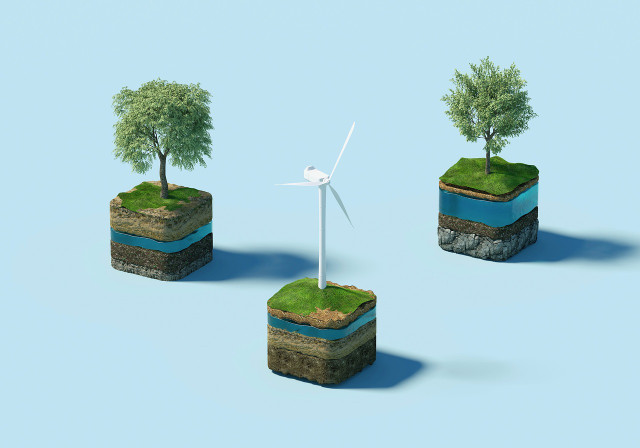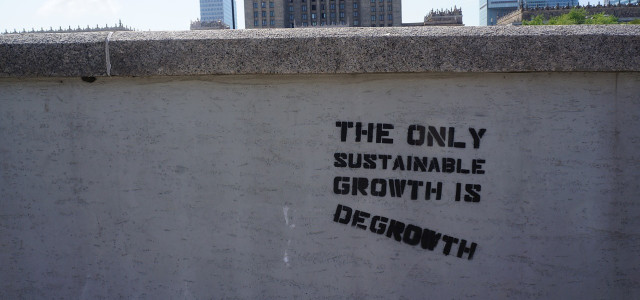Dematerialization is a means of getting more from less. Some economists see it as the way toward a more eco-friendly world, but is it a sustainable practice?
Essentially, dematerialization aims for continued growth with less material consumption. We’ve all heard the contradictory phrase “less is more.” In the last 30 years, this concept has entered the world of economics, often discussed along with other technical terms like decoupling and ecoefficiency. These phenomena all refer to the same idea: growing the economy without increasing the material intake of goods.
The last few years have seen a massive rise in the use of digital technology. For example, consider how much technology has become obsolete in your lifetime because of the smartphone. It meant no more need for landlines, scanners, GPS, videotapes, CDs or cassettes. The smartphone has it all. This evolution isn’t limited to electronics but includes a whole range of objects and processes we use every day.
Dematerialization is also taking place in agriculture technology. This is known as precision agriculture, a farming method that uses technology to observe, measure and respond to the irregularity of crop growth. The goal is to optimize crop yield while preserving water, fertilizer and land resources.
At first glance, dematerialization sounds great — finally, some good news for the environment. However, if it sounds too good to be true, that’s because it is.
Decoupling and Dematerialization

(Foto: CC0 Public Domain / Unsplash - Jacob Vizek)
To understand the origins of dematerialization, you first need to understand decoupling. This engineering term describes a change in the interdependence of two systems. It’s also the term for when two train cars detach from each other — picture a train that splits so the two halves can continue down separate tracks.
Economists use the term “decoupling” to discuss the separation of economic growth from the consumption of raw materials (that we use to create goods to boost the economy). However, when an economist claims that decoupling is happening in our society, they’re saying these two systems are now independent of one another.
In other words, economic growth and consumption of raw materials are not only the two split halves of a train; each now has its own engine, moving it down a separate track.
In More From Less, his book on dematerialization, economist Andrew McAfee argues that decoupling in more prosperous economies is a sign that the environmental impact of human economies is diminishing. McAfee believes this is because technological innovations that seek to combine functionalities and reduce the overall cost of production are in high demand.
McAfee says that reducing our consumption of raw materials is an optimal solution to the climate crisis. In his TEDx talk on the subject, he states:
“[Dematerialization is] the best environmental news in the world, and for our planet, it’s life by a thousand cuts.”
But how is it sustainable? Surely unnecessary consumption of any kind is no way to encourage a greener future. While it’s possible to consume less, making the world more sustainable isn’t easy.
The Limits of Dematerialization



(Foto: CC0 / Pixabay / RoadLight)
The elephant in the room is that this dematerialization depends entirely on access to advanced technology and a booming economy from which ecological impact can be decoupled. When half of the world’s wealth is held by only 1% of the population, and half the global population holds only 1% of the wealth, the possibility of dematerialization through global technological advancements seems questionable.
This issue is compounded when we look beyond income to measure wealth. When comparing opportunities for healthcare, education and living standards, 1.3 billion people in 107 developing countries, a majority of which are part of the global south, are multidimensionally poor. Without the proper funding, it seems unlikely they will be looking to dematerialize anytime soon.
Even in the US, 11% of the population lives in poverty — higher than the global average. While we can take steps towards dematerialization, it is difficult for individuals to invest in expensive technology.
But even if we can figure out how to achieve global dematerialization, the dematerialization we are currently experiencing is nothing to celebrate. As Janne M. Korhonen, Ph.D., MSc of the Turku School of Economics, pointed out in their review of McAfee’s book, the central message of dematerialization is “basically demolished by a single open access article.” This particular paper, Wiedmann et al. 2015, concludes that if there really has been a decoupling through dematerialization, it is practically insignificant in ecological terms.
While we may be using less of some materials, we aren’t eliminating the consumption of raw materials. For example, over the last century, the US has seen a considerable decline in the usage of metals, but paper and plastic use is growing. While the US uses less dense materials, like timber and steel, we are replacing them with aluminum and plastics.
The vast majority of research suggests that any potential to get greener and cleaner via dematerialization depends on whether we can make this practice absolute. In other words, when we stop using a material, we must stop using it completely. Instead, what seems to be happening is that we’re just replacing the old material with new, less dense materials.
Read more: Closed-Loop Recycling: How It Works
Will It Ever Be the Solution?



(Foto: CC0 / Pixabay / Fitschen)
Seemingly simple solutions can be tempting. Dematerialization invites us to engage in cautious optimism and congratulates us on our entrepreneurship. It could steer us away from environmental disaster caused by the overconsumption of raw materials.
American economist William J. Baumol’s work on the importance of the entrepreneur has been linked to the success of this optimism, dubbed new growth theory. Crucially, Baumol concerns himself not with the environmental toll of economic growth but with the innovations that can transcend it. Naturally, many economists look favorably on this model of growth.
Obviously, improving the efficient use of materials is not a bad thing. We need new and innovative farming methods to keep up with population growth. We also need to find more sustainable alternatives to fossil fuels through renewable means. Finding ways to produce less waste at the consumer and production levels is crucial.
The problem is that our motivation to find these alternatives is not purely environmental. As McAfee says in his TEDx talk:
“Dematerialization does not happen because we spontaneously give up the desire to consume and embrace the philosophy of degrowth. It doesn’t happen because we’re noble. It happens because we’re cheap.”
The motivating force is capital gain. With this in mind, it’s easy to see how the concept of dematerialization does not align with the sustainable ethos it hides behind.
Could Dematerialization Help Build a Sustainable World?



(Foto: CC0 / Pixabay / JLB1988)
If the industrialized world desires no fundamental or radical change in its economic system but wants to maintain its economic growth, dematerialization needs to be global and permanent. We need to reduce our consumption of materials absolutely. Unfortunately, this is not happening.
A 2014 research paper concluded that while “all industry sectors are improving the efficiency of use of materials and are continually introducing improved materials…dematerialization does not inevitably lead to less waste and less environmental impact.” There is no substantial evidence that dematerialization is taking place profoundly enough to effect the change necessary for a sustainable future.
Fundamentally, dematerialization concerns the first of the 3 Rs of waste management: reduce, reuse and recycle. However, with dematerialization, there is no active incentive to cut down waste apart from a bias toward profit. Entrepreneurs don’t make a profit when we reduce our continued consumption of goods, such as refusing to buy items we don’t need or fixing what we already have.
In terms of sustainability, the reduction posited by dematerialization can never be significant enough to counteract our continued and unnecessary overconsumption of the Earth’s limited raw materials. Author and economic thinker E.F. Schumacher’s idea of creative destruction addresses this crisis of consumption:
“Scientific or technological solutions which poison the environment…are of no benefit, no matter how brilliantly conceived or how great their superficial attraction.”
Sustainability through reduced use of finite resources is the superficial attraction of dematerialization.
So, while it is a step in the right direction, dematerialization is not the final step in making the world more sustainable. It will never be a sustainable practice unless we can move the goal of dematerialization away from profit.
The more we encourage individual innovation over global change, the less we focus on the real issues our economies cause to the environment. In this way, perhaps, less really is more.
Read more:
- 10 Must-Watch Environmental Documentaries
- How Sustainable are Online Streaming Services Really?
- Human Environment Interaction: Definition & Examples
Do you like this post?







